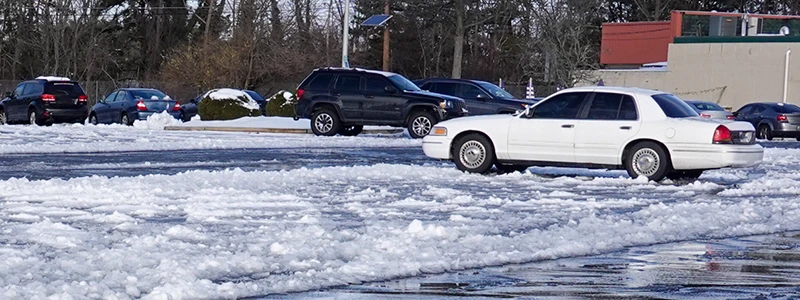Your cart is currently empty!

Can you be sued for an icy parking lot?
As winter approaches, property owners and managers must prepare to keep their premises safe for guests and customers. One of the most common winter hazards is an icy parking lot. Slip and fall accidents can happen even with the best preventative measures, and when they do, property owners may find themselves facing legal action. In this article, we’ll explore whether you can be sued over an icy parking lot and what steps you can take to protect yourself.
First, let’s establish the legal basis for a lawsuit. Property owners have a legal obligation to maintain their premises in a reasonably safe condition. This means taking reasonable steps to identify and remedy hazards, such as an icy parking lot. Failure to do so can result in liability for injuries sustained by guests and customers.
But what if the hazard was open and obvious? In some cases, property owners may argue that the hazard was open and obvious and therefore the guest or customer should have been aware of the risk. However, this argument is not always successful in court. The property owner still has a duty to warn guests and take reasonable measures to mitigate the risk of the hazard.
So what steps can you take to protect yourself? Here are some best practices:
- Take action to protect vulnerable or dangerous areas of your property. Put up caution tape, cones, signs, etc. Let people know where you don’t want them to be.
- Document the hazard. If you have a hazard that is open and obvious and an accident occurs, you should document the hazard with pictures as Kroger did with the concrete patch. This can help establish that you were aware of the hazard and taking steps to address it.
- Document any measures you took to avoid the accident. If an accident occurs, you should document any measures you took to avoid the accident, provide notice to customers of the hazard, and any other steps you took to mitigate the risk of the hazard. This can help establish that you were taking reasonable steps to keep your premises safe.
- Warn customers of potential hazards. You should warn customers of potential hazards, and although a verbal warning is enough, you should have the warning in writing when possible such as a notice at every entrance, the use of a safety cone, and/or a caution sign. This can help establish that you were taking reasonable steps to warn guests of the hazard.
- Pay special attention to hazards in less open areas. Hazards that are in less open areas may not be easily noticed, such as between cars. You should pay special attention to these areas and take reasonable steps to address any hazards.
In conclusion, property owners can be sued over an icy parking lot, even if the hazard was open and obvious. However, by taking reasonable steps to identify and address hazards, warn guests of potential hazards, and mitigate the risk of hazards, property owners can reduce their risk of liability. Remember to document any hazards and steps taken to address them, and pay special attention to less open areas where hazards may be less noticeable.